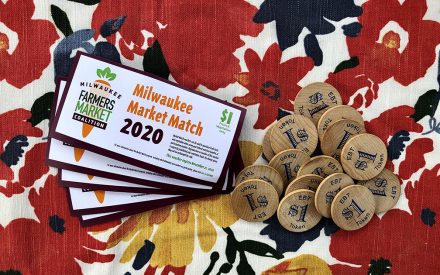Food security—defined as the assured physical and economic access to sufficient, safe, and nutritious food needed for healthy, active living—is critical to family and community well-being. The COVID-19 pandemic shone a spotlight on inequities in our food system, exacerbated food insecurity, and amplified pre-existing vulnerabilities in the food system, including production, processing, transportation, consumption, disposal, and emergency food systems. Residents in Wisconsin faced greater food security challenges due to job losses, underemployment, disrupted food and nutrition programs, and a stressed emergency food system.
In response, staff in Extension’s FoodWIse and Healthy Eating Active Living Programs worked with multi-sector partners throughout 2021 to support policy, systems, and environmental changes. This included work to improve nutrition policies for community meals and systems-level changes that increased access to healthier foods for food bank participants and seniors.
Extension educators in Manitowoc County worked with the First Presbyterian Community Meals program to advance implementation of a nutrition policy to increase access to healthy foods among community members. Extension provided technical assistance to develop a nutrition policy that uses the USDA MyPlate model as a guide for serving nutritious food; prioritizes food safe standards; and details a donation policy which emphasizes nutritious foods and refuses unhealthy donations. Extension educators worked with a UW-Green Bay volunteer and Master Gardener Volunteers to add year-round fresh produce to the meals.
Extension supported the Dane County Executive’s office in launching the first-ever local purchasing program. The program allowed Dane County farmers who had lost access to markets to sell their food to Dane County’s largest food bank, Second Harvest. The food bank distributed the food to its vast network of food pantries, thus increasing healthy food access for food insecure Dane County residents.
Extension collaborated with the Milwaukee-based organization Hunger Task Force to increase the distribution of the USDA Commodity Supplemental Food Program, known as Stockboxes for Seniors. Educators in Bayfield, Portage, Fond du Lac, Wood, Lincoln, Langlade, and Marathon counties worked with local partners to coordinate the distribution of the Stockboxes. This increased the nutrition security of seniors with limited incomes. Food boxes with recipes and resources were distributed to eligible seniors monthly through a collaboration between aging and disability resource centers, housing authorities, nonprofit organizations, local health departments, and coalitions of local food pantries,
Extension’s work led to increased access to healthy food for communities disproportionately impacted by health inequities. In Manitowoc County, a nutrition policy was implemented that increased access to healthy foods and distributed fresh salads to 150 community members through a community meal site. In Dane County, over 6 million pounds of food was purchased directly from farmers for distribution to food pantries. In Portage and Wood counties, project partners distributed 18,000 pounds of food to eligible seniors in the last four months of 2021.
Extension supports multi-sector partners in improving nutrition policies and emergency food systems to increase access to healthier foods.
Food security is a focus of Extension’s Health & Well-Being Institute. Learn more by visiting healthyliving.extension.wisc.edu.
Download Article

 Healthy markets, strong communities: Enhancing EBT at farmers markets
Healthy markets, strong communities: Enhancing EBT at farmers markets Improving FoodShare Utilization at Farmers’ Markets Through a Multilevel Intervention
Improving FoodShare Utilization at Farmers’ Markets Through a Multilevel Intervention Positive Coping Strategies to Reduce Stress
Positive Coping Strategies to Reduce Stress An Improved Geologic Map of Wisconsin
An Improved Geologic Map of Wisconsin


